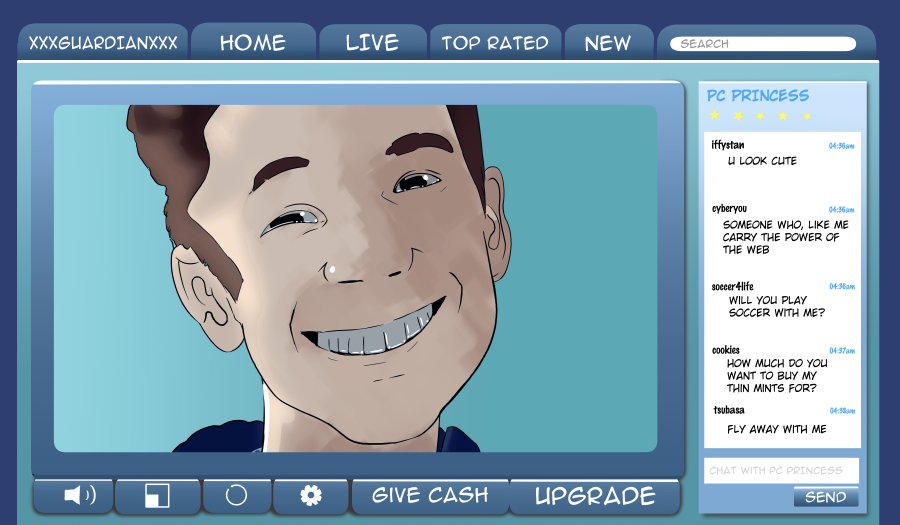If you search “famous ucsd alumni” on Google, one of the first people you will see is Evelyn Lin, a prominent pornographic actress who first began making adult entertainment films while attending UC San Diego in the late 2000s.
Lin is not the sole UCSD student in her profession. While there is no official data on the matter, I have encountered a number of peers on-campus who have supplemented the cost of tuition and other expenses by partaking in the adult entertainment industry, whether it be through startups like OnlyFans, or more established outlets like PornHub and Brazzers.
The UCSD students I reached out to for comment on their involvement all declined to be interviewed. Those that responded stated that they had to keep their profession a secret in order to evade judgement from their peers.
Stigma surrounding adult entertainers is nothing new, as Western society has historically maintained a certain level of sexual conservatism. While recent praise surrounding music videos like “Cyber Sex,” which features singer Doja Cat as a camgirl, and movies like “Hustlers,” a movie about strippers, reflects a departure from this cultural mantra, the vast majority of society still negatively views adult entertainers. This is a problem because this stigma is degrading to those who work in the industry.
Duke University graduate Miriam Weeks experienced this stigma first hand. Weeks, who chose to create pornography to pay her nearly $50,000 in tuition and fees, faced an onslaught of criticism and threats once her secret was out.
“People said that I deserved to be raped and murdered,” Weeks said in an interview with The News and Observer. “I had people threatening to run me over with their cars. Probably the most hurtful thing was there was a suicide countdown for me on one web site, of people making bets on when I’d succumb to all the harassment and kill myself.”
No one should experience this level of hate, and I personally have a hard time understanding where this disdain for the industry stems from. Whether one chooses to work in the industry to pay their way through university or simply to make a little extra cash on the side, what these workers choose to do with their bodies should not be up to the scrutiny of others, as their actions affect no one except themselves.
In an Op-Ed for Cosmopolitan, an anonymous General Surgeon explained her decision to become a stripper as a way to pay her way through medical school. The context under which she decided to become a stripper mirrors the experiences of many UCSD students — she said she first tried working full time in a traditional job, but saw that her academics suffered due to the lack of sleep she experienced having to balance work and school. The decision to become a stripper made sense in her situation, as she earned enough to get by with a limited amount of hours worked. However, this decision was not one she felt she could express to her classmates.
“I definitely would have been judged if other people knew,” she wrote. “Medical school, and forgive me for saying this, is filled with very cliché kids. Their father and grandfather were surgeons, they have a summer home in the Hamptons, they got a new car for their 16th birthdays, and every other year they go backpacking through Europe. That was about 85 percent of my graduating class.”
With the ongoing COVID-19 pandemic limiting the amount of jobs available to students, several have understandably turned toward camwork to pay for their college expenses. Since the epidemic began, OnlyFans has reported a 75 percent increase in sign-ups. However, this increase in participation has not decreased the stigma surrounding adult entertainment at large.
One subtler form of stigma comes in the form of making fun of the profession, claiming that it is “easy” and a way to cure “quarantine boredom.” Gwen Adora, an adult content creator, explained how jokes and fetishizations of the industry broaden its stigma in an interview with Vice.
“Our community deals with so much and that ranges from stigma to people being murdered,” Adora said. “When people make jokes like, ‘Oh, ha ha ha, sex work is so funny, let’s start an OnlyFans,’ they don’t acknowledge the gravity of our situation.”
Adora’s argument showcases how even subtle stigmas harm adult entertainers. Especially for those in college who are already trying to balance their job with school and daily life, the damage that the stigma creates can both affect one’s academic success as well as their mental health.
For you Tritons who are struggling to make ends meet and have decided that the adult entertainment industry financially makes sense, I applaud you and support your decision. This is both a difficult and personal choice to make.
As for those of you who want to criticize your fellow adult entertainers, I ask you to take an introspective look before you comment on the matter. Does your classmate’s involvement in the industry have any effect on your personal life? And most importantly, do you have the privilege to not have to make such a stigmatized decision in the first place?
College is difficult, and these difficulties have been even more magnified with the ongoing pandemic. We must support one another rather than tear each other apart. We all face a number of difficulties unique to ourselves, and not one of us is any better than the other.
Artwork by Anthony Tran of the UCSD Guardian Art Department.














